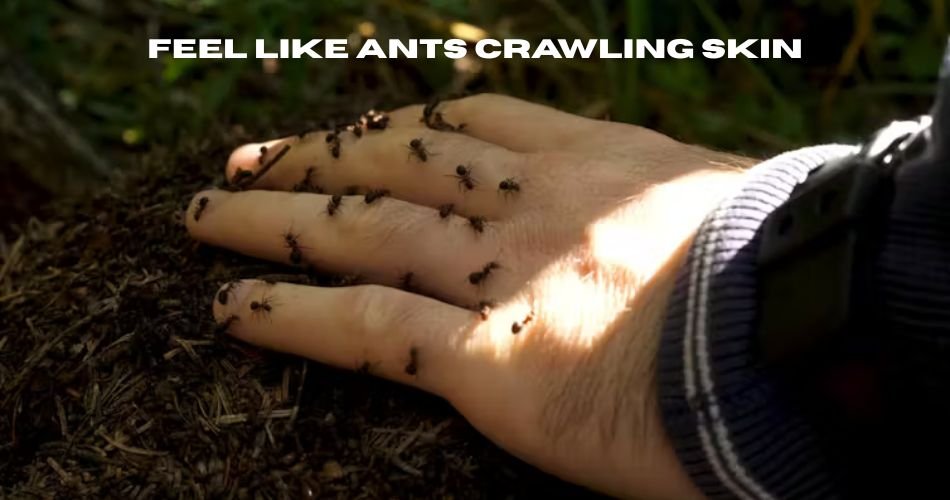Have you ever experienced the strange and unsettling sensation that feel like ants crawling skin, even when there’s nothing there? This phenomenon, often described as tingling, itching, or pins and needles, can be both confusing and deeply uncomfortable. Scientifically known as “formication,” this symptom can arise from numerous causes—some harmless, others more serious. In this article, we will dive deep into what triggers this sensation, how to identify it, and what steps you can take to find lasting relief and peace of mind.
The Medical Definition of Formication and Why It Feels So Real
Formication is a type of paresthesia, which is a sensory condition that causes abnormal skin sensations without any physical stimulus. It gets its name from the Latin word formica, meaning ant, because of the eerie similarity to insects crawling on the skin. People experiencing formication often report feelings of movement, itching, or burning on or just beneath the skin’s surface. The sensation can be localized or spread across different parts of the body, often without any visible changes on the skin. While this might sound like a minor annoyance, it can become incredibly distressing, especially when it persists or disrupts sleep and daily functioning.
Why Do I Feel Like Ants Are Crawling on My Skin Without Any Insects Present?
There are many reasons why someone might feel like ants crawling skin, and not all of them have to do with skin problems. In fact, the majority of cases are caused by internal issues affecting the nervous system, psychological state, or even nutritional imbalances. Sometimes, the skin itself isn’t the problem—it’s the nerves beneath it. These nerves can misfire due to injury, disease, or chemical changes in the body, leading to misleading sensations that feel like insects crawling. In other situations, the cause might be psychological, where the brain perceives something that isn’t physically present due to stress, anxiety, or trauma. Understanding the root cause is essential for finding the right treatment.
Neurological Disorders and Nerve Damage That Trigger Crawling Sensations
One of the most common reasons people feel like ants crawling skin is nerve-related. Peripheral neuropathy, a condition caused by damaged or malfunctioning peripheral nerves, often leads to formication. Diabetes is a major risk factor here, as high blood sugar levels can gradually destroy nerve endings. Similarly, conditions like multiple sclerosis and fibromyalgia also interfere with nerve signals, resulting in odd sensations like crawling, tingling, or burning. Pinched nerves from spinal issues or herniated discs can also create localized crawling sensations, typically affecting one arm, leg, or side of the body depending on where the nerve compression occurs.
Mental Health and Psychological Causes of the Crawling Feeling on the Skin
Not all causes of crawling sensations are physical. Mental health plays a significant role, too. Anxiety, panic disorders, and stress can all cause sensory hallucinations, where the brain interprets stress-induced nerve activity as something crawling on the skin. One of the more extreme psychological causes is delusional parasitosis, a psychiatric condition where individuals believe they are infested with parasites. This belief can become so intense that the person may scratch their skin raw trying to remove imaginary insects. Less severe forms of this sensation can occur during anxiety attacks or after prolonged periods of insomnia, where the brain becomes hypersensitive to even normal skin sensations.
Skin Conditions That Create the Illusion of Crawling Sensations
While neurological and psychological causes are common, certain dermatological conditions can also trigger crawling feelings. Scabies, a skin infestation caused by tiny mites, is a legitimate medical condition where patients genuinely have crawling sensations—because mites are burrowing into the skin. Other conditions like eczema, psoriasis, or allergic dermatitis can inflame the skin, causing intense itching that feels like bugs are moving. In these cases, visual signs such as redness, bumps, or scaling usually accompany the sensation. Extremely dry skin can also cause nerve endings to become overly sensitive, producing sensations of crawling, prickling, or burning.
How Nutritional Deficiencies and Hormonal Changes Can Lead to Skin Crawling Sensations
What you eat—or don’t eat—can also play a big role in how your nerves function. Vitamin B12 deficiency is a well-known cause of paresthesia, including the feeling of ants crawling on the skin. This essential vitamin helps protect nerve endings and ensures proper communication between the brain and body. When levels drop, nerves can become damaged, resulting in bizarre and uncomfortable skin sensations. Other nutritional deficiencies, such as low levels of vitamin D, magnesium, or iron, can also disrupt nerve function. Hormonal changes, especially those during menopause or thyroid disorders, have been linked to increased skin sensitivity and crawling feelings, particularly at night.
Drug Use and Medication Side Effects That Mimic the Crawling Sensation
Certain prescription drugs and illicit substances can cause formication as a side effect. Stimulants like amphetamines, cocaine, and methamphetamine are notorious for producing the sensation of bugs crawling under the skin—a hallucination known as “cocaine bugs.” People going through alcohol or drug withdrawal might also experience this as part of the detox process. Even common medications like antidepressants, anti-anxiety drugs, and blood pressure medications can sometimes affect the nervous system in ways that cause tingling or crawling feelings. If a new medication coincides with the onset of this symptom, it’s important to speak with a doctor.
Why the Crawling Sensation Is Often Worse at Night
Many people notice that the sensation of ants crawling on their skin becomes more intense at night. This is partly because there are fewer distractions, so we become more aware of every little itch or tingle. Restless Leg Syndrome (RLS) is one condition that can cause nighttime crawling or tingling sensations, especially in the legs. Hormonal shifts that occur at night, changes in body temperature, and even anxiety about trying to fall asleep can all amplify skin sensations. People with insomnia often become hypersensitive to these feelings, creating a cycle where worry about the sensation makes it worse.
How to Diagnose the Root Cause of Crawling Sensations on the Skin
Getting to the bottom of why you feel like ants crawling skin usually requires a detailed conversation with a healthcare provider. They’ll want to know about your overall health, any medications you’re taking, and whether you’re experiencing other symptoms like numbness, weakness, or visible skin changes. Depending on the suspected cause, your doctor may order blood tests, nerve conduction studies, imaging tests like MRIs, or refer you to a specialist. The key is to look at the full picture—physical, neurological, and psychological—to understand what’s going on.
Medical Treatments That Provide Relief from Persistent Crawling Sensations
Treatment depends on the underlying cause. For neuropathy-related cases, medications like gabapentin or pregabalin can help calm overactive nerve signals. If a vitamin deficiency is responsible, supplements and dietary changes may reverse the symptoms over time. For psychological causes, therapy combined with antidepressants or anti-anxiety medications can significantly reduce the crawling feeling. In the case of skin conditions, prescription creams, antihistamines, or anti-parasitic treatments may be used. What matters most is addressing the core issue instead of just masking the symptoms.
Natural Remedies and Home Treatments to Ease the Crawling Sensation
If you’re looking for natural ways to reduce that uncomfortable crawling feeling, several options are available. Regularly moisturizing your skin can reduce dryness-induced irritation. Taking warm baths with Epsom salts may soothe nerves and reduce tingling. Dietary changes that include more leafy greens, healthy fats, and whole grains can improve nerve health. Herbal teas like chamomile or passionflower can help manage anxiety that may be contributing to your symptoms. Practicing mindfulness meditation or deep breathing exercises can also calm the nervous system and lower the chances of stress-related formication.
Lifestyle Changes That Support Healthy Nerve Function and Skin Sensitivity
Prevention is always better than cure. Keeping your nerves healthy involves a mix of good nutrition, regular exercise, and quality sleep. Avoid smoking and excessive alcohol, both of which can damage nerves. Stay hydrated and use sunscreen to prevent skin damage that could increase sensitivity. For those prone to anxiety, regular mental health check-ins, journaling, or even yoga can keep your stress in check. Wearing loose, breathable clothing and using hypoallergenic skin products can also reduce irritation and sensations of crawling on the skin.
What You Can Do When the Sensation Strikes
If you’re suddenly overwhelmed with the feeling of ants crawling on your skin, try not to panic. Rinse your skin with cold water, which can help “reset” nerve endings. Use grounding techniques—such as focusing on physical textures around you—to distract your brain from the sensation. If the feeling persists, jot down the time, location, and any accompanying symptoms. This can help a healthcare provider make an accurate diagnosis later. And remember, while the sensation is real and disturbing, it is often treatable once the root cause is identified.
Misconceptions That Make the Experience Even More Confusing
It’s easy to assume the worst when your skin feels like it’s crawling. Many people immediately think they have a parasite, even when there’s no evidence. Others believe they’re going crazy, especially when doctors can’t find a cause right away. But feeling like ants crawling on skin doesn’t always mean something dangerous is happening. It’s a symptom—one that requires careful consideration, not panic. Understanding that it might be nerve-related, stress-induced, or linked to a deficiency can bring clarity and hope.
Conclusion
The sensation of ants crawling on your skin can be disturbing, confusing, and even frightening. But you’re not alone—and more importantly, you’re not imagining it. Whether it’s caused by a physical condition, a mental health issue, or something as simple as dry skin, there are real solutions out there. Pay attention to your body, track your symptoms, and seek medical help when necessary. With the right diagnosis and treatment, you can find relief and regain control over your skin—and your peace of mind.






